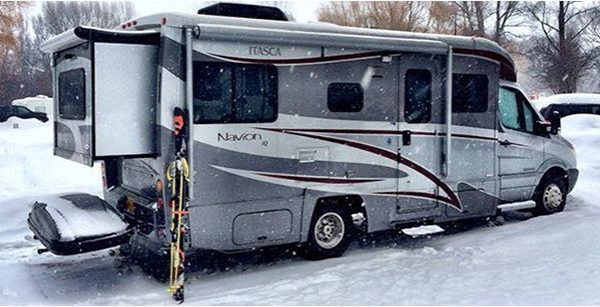The wisest tip anyone can give you is to change your plans if you learn that a severe storm is headed your way just as you’re about to head out on the road. You’ve looked forward to this trip for a long time and anticipated that winter RVing would be fun for everyone, but safety should always come first. Even when you follow the weather closely, you might get caught in a blizzard when the forecast only predicted a mild flurry. Don’t brave it and drive into the storm thinking your motorhome is big and strong. While RVs weigh more than most vehicles, the traction on standard RV tires and the steering on most rigs makes driving an RV during a storm quite dangerous. If you are out in winter conditions, the following are some tips to keep you safe and comfortable.
-
- Hopefully, your RV is winterized and has plenty of antifreeze to prevent frozen pipes. If you need instructions on winterizing your RV on your own, click here.
- Make sure you have a winter kit that includes at least one ice scraper and a snow shovel. You may also want to bring salt, jumper cables, flashlights and extra batteries.
- Make sure you have the right tires and that they are properly inflated to manufacturer’s specifications.
- Set up your smartphone to get weather alerts in case of an oncoming storm and alter your itinerary accordingly. You should ideally have a solar powered emergency radio as well.

- Stay on heavily used, main roads. Highways are fine too.
- Reduce your speed and double the usual distance between you and the car in front of you.
- Avoid hills.
- Avoid roads with slopes.
- Drive only while there’s still light out.
- Don’t drive alone, if you can avoid it. If you can’t help it, stay in constant contact so people know you’re okay or if they need to send help.
- Make sure you’re not fatigued behind the wheel. If you are, stop and rest before getting behind the wheel again.
- Make frequent stops. It may be tempting to keep going until you reach your destination, but stopping and resting your eyes is a wise thing to do.
- Eat enough. Your body needs more food in cold weather. Eat healthfully instead of sweets which will give you a burst of energy but ultimately cause your energy level to crash.
- Bring extra sweaters, layers, blankets, hats and gloves.
- Stay hydrated. You can get dehydrated in cold conditions. It’s especially dangerous when you are driving long distances because dehydration causes fatigue, which can be deadly on icy roads.
- If you’re struck by a blizzard while driving, turn on your hazard lights and pull off the highway. Remain in your car until help arrives. Just make sure to run your engine for 10 minutes every hour to stay warm. Make sure to get ventilation to prevent carbon monoxide from building up (check your exhaust pipe too to make sure it’s clear).
- If you get stuck on a snowy road overnight in your RV, turn on your interior lights so rescuers will see you.
For more information on RV tires that are suitable for winter driving and special steering tips for driving over snow and ice, click here. Also, make sure you have adequate RV insurance on your motorhome, trailer or camper. RV insurance is different from auto insurance, so call (866) 501-7335 to speak with an insurance specialist about your coverage options and to get multiple quotes.
The information in this article was obtained from various sources. This content is offered for educational purposes only and does not represent contractual agreements, nor is it intended to replace manuals or instructions provided by the manufacturer or the advice of a qualified professional. The definitions, terms and coverage in a given policy may be different than those suggested here and such policy will be governed by the language contained therein. No warranty or appropriateness for a specific purpose is expressed or implied.
